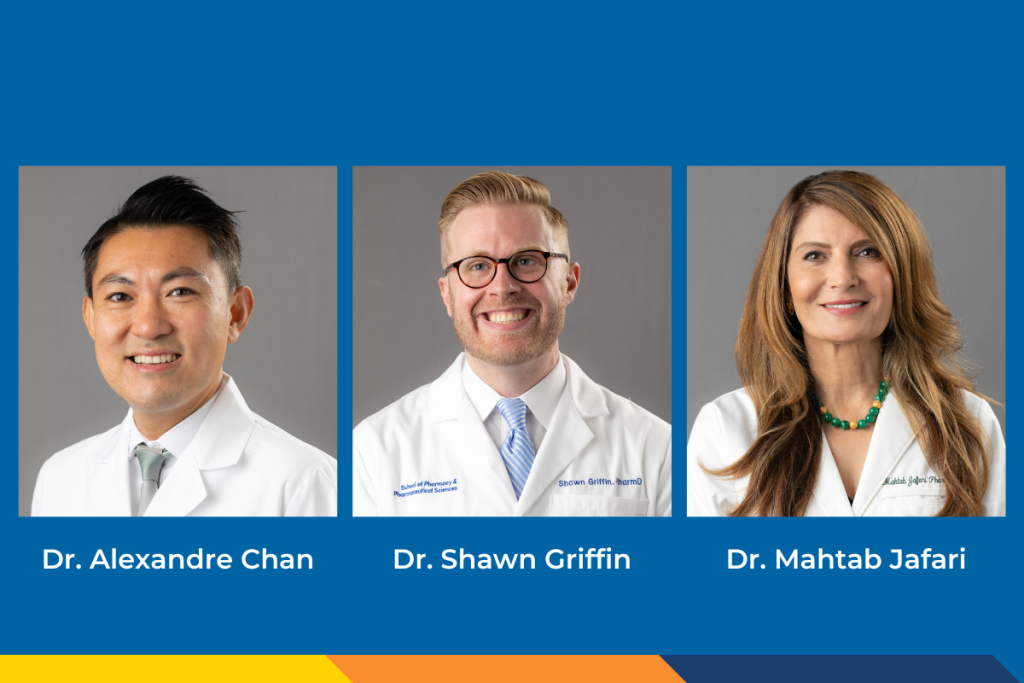National Cancer Prevention Month with Dr. Alexandre Chan, Dr. Shawn Griffin, and Dr. Mahtab Jafari
February is National Cancer Prevention Month. This annual observance serves as a reminder to live a healthy lifestyle and make choices that can help to minimize your risk of cancer and highlights the contributions of healthcare professionals and researchers who are making important strides in cancer prevention studies and practices.
Dr. Alexandre Chan, Dr. Shawn Griffin, and Dr. Mahtab Jafari are three of the many faculty members in the UC Irvine School of Pharmacy & Pharmaceutical Sciences who advance the field of cancer research and work with patients to help minimize their risk for cancer, as well as help to prevent further health issues in people who are currently fighting cancer or are cancer survivors.
“A lot of my work focuses on survivorship care in cancer survivors, especially for cancer survivors who are at risk for second cancers,” said Dr. Chan. “For example, my recent work has shown that young adult cancer patients who are having neuropsychiatric issues (such as depression, anxiety, and cognitive impairment) are found more likely to vape — a behavior that should be discouraged in these patients, as tobacco exposure may increase these patients’ risk for second cancers.”
“Much of my research focuses on ensuring patients are receiving the right dose of oncology-related medications,” shared Dr. Griffin. “This is important because many chemotherapy medications can actually cause new cancers. Ensuring patients do not receive too much chemotherapy can reduce the risk of secondary cancers in oncology patients.”
Dr. Jafari stated: “My research focuses on evaluating the impact of various personalities on adherence to life-saving drugs that can save the lives of patients with CML (a form of blood cancer). The ultimate goal is to develop educational materials that consider patients’ personalities and help them to adhere to their therapies.”
Risk factors for cancer vary widely. While some types of cancer can be traced to genetics (such as breast cancer) and non-preventable characteristics like the age or sex of a person are factors as well, lifestyle and environment are major contributors to the development of cancer.
Some cancer prevention tips shared by Dr. Chan, Dr. Griffin, and Dr. Jafari include:
- Wear sunscreen
- Avoid drinking alcohol and smoking
- Maintain a nutritious diet free of excessive red meats, sugars, and processed foods
Preventable causes like sun exposure, the consumption of alcohol and unhealthy foods, smoking, and others contribute to over 40% of cancer cases and almost half of all cancer-related deaths, according to the American Association for Cancer Research (AACR).
Despite this fact, the importance of cancer prevention research remains undervalued: “I would like to see more research funds go toward cancer prevention — for example, diagnostics and intervention to prevent cancer,” said Dr. Jafari. “Currently, about $25 billion is spent globally on cancer research, and only a very small fraction, less than 10% of these funds, is spent on cancer prevention research.”
Dr. Chan, Dr. Griffin, and Dr. Jafari emphasized the importance of discussing cancers you may be at risk for with your doctor or pharmacist and getting regular screenings to help increase the likelihood of early detection. Pharmacists play a crucial role in helping people live healthy lifestyles and providing services that can contribute to cancer prevention.
“There are a number of ways that pharmacists can help to prevent cancer, including promoting general public awareness on prevention and screening, providing education on cancer prevention for vulnerable populations, identifying potential people who are at risk and recommending screenings, and offering services to help patients to reduce their risk factors,” said Dr. Chan.
“Board Certified Oncology Pharmacists are experts in cancer screening and risk factors for cancer,” said Dr. Griffin. “We are another healthcare provider (in addition to doctors, nurses, and specialists) that can discuss cancer prevention strategies with patients.”
